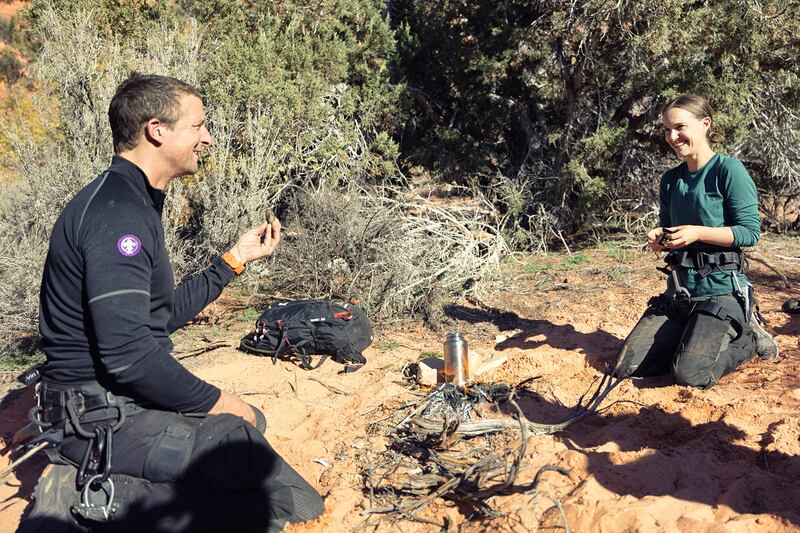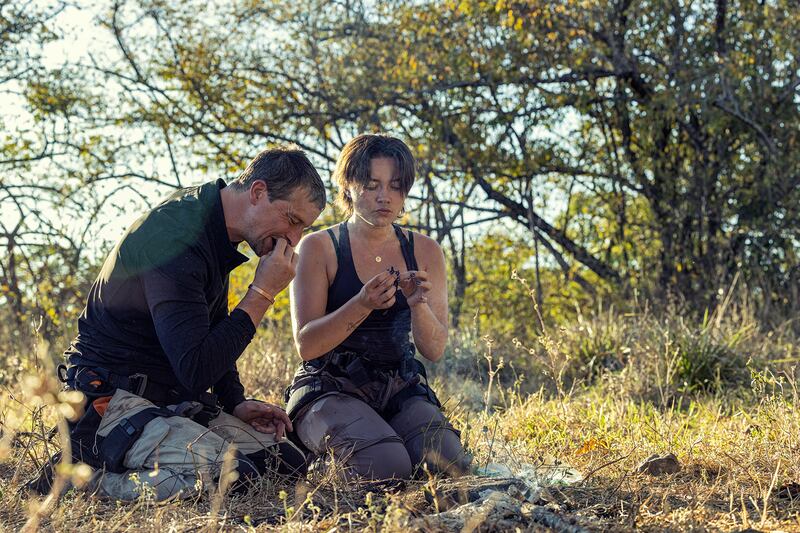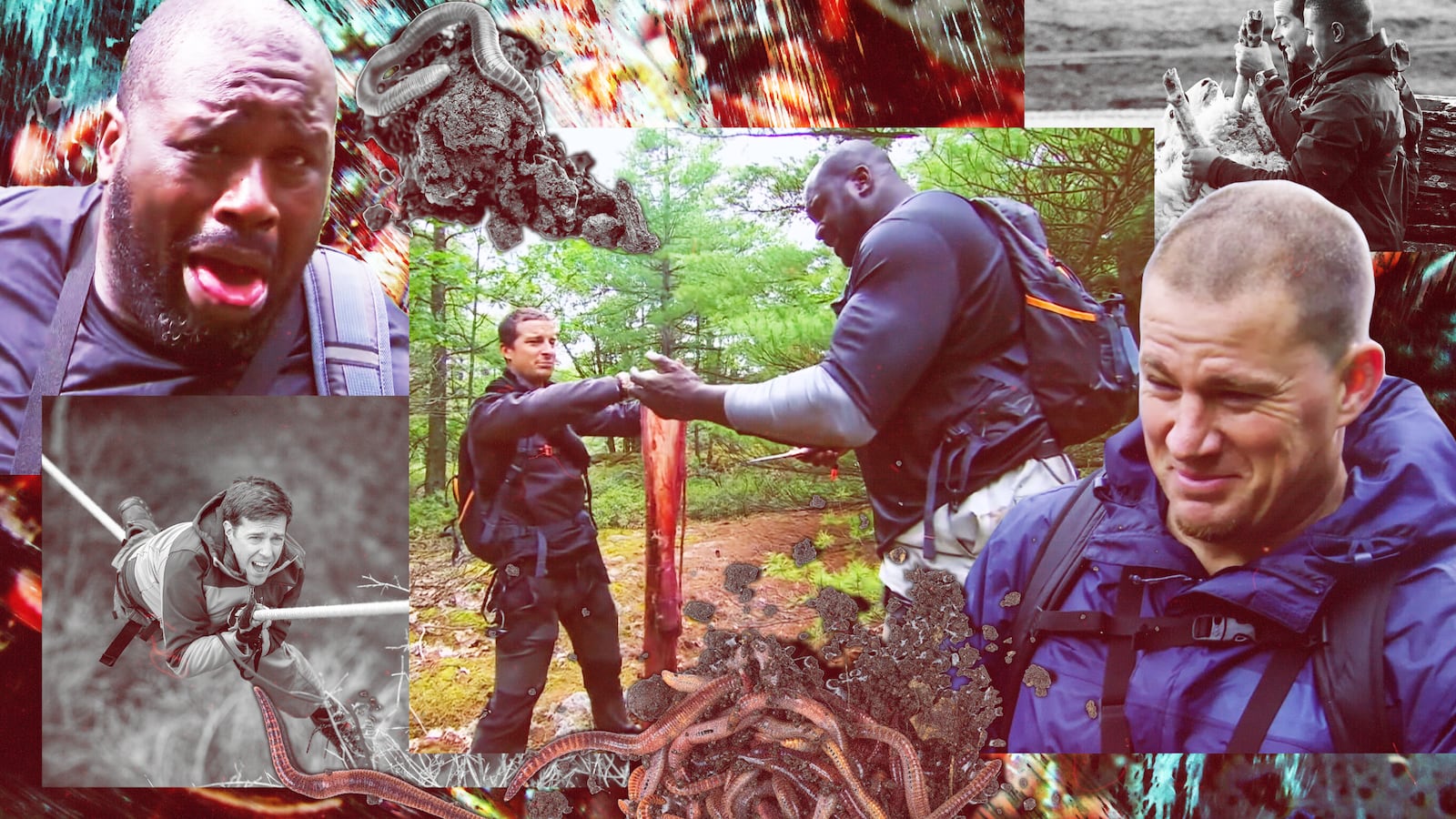Running Wild isn’t the most likely contender for the celebrity talk show circuit, and host Bear Grylls is the first to admit it.
“It’s not like a chat show, where you’ve got three minutes to tell a funny story about your movie you’ve just done,” Grylls, the adventurer-turned-TV star, told The Daily Beast in an interview earlier this month. Instead, it’s a high-stakes survival game turned heart-to-heart.
Best known for his solo adventuring days on Man vs. Wild, Grylls has spent the past several years sharpening his skills by keeping celebrities alive on Running Wild with Bear Grylls. The British survivalist returned to National Geographic on July 25 with the seventh season of his show, now titled Running Wild with Bear Grylls: The Challenge. In the latest installment, he focuses on teaching his famous guests specific survival skills, including one tactic that they must utilize by the end of the episode in order to complete their adventure (the newly minted “Challenge” aspect of the series).
“The reason we’ve called it The Challenge is that I’m not just going to guide them on a journey, as I’ve done for many seasons on Running Wild,” Grylls said. “This time, I really want to empower them with skills and actually get them by the end to be leading, to be making decisions, and to have some real consequences to their skills.”
Grylls kicks off the season with a trek through the Escalante Desert alongside Natalie Portman. During their journey, Grylls teaches Portman how to light a signal fire and has her undertake the task in a timed effort on her own. It’s a slightly more intense take on previous seasons, which usually never got much more hardcore than having guests follow Grylls’ lead.
But the extra challenge only helps with heightening the camaraderie of the show and leads to deeper talks—the longtime highlight of the series. Grylls gently tosses out questions to his guests throughout each episode, but he reserves the tougher topics for the fireside (or hot temperature campsite-equivalent) portion of the show.
“I really mean it when I say the wild does my job for me,” Grylls said. “I think if you’ve faced a few fears together, and you’re crossing a few rivers [and] climbing a few cliffs, by the time you sit down around a campfire, you’re, first of all, exhausted. You, secondly, trust each other.”
As night approaches and the duo chow down on charred cactus against a crackling fire (arguably one of the tamer culinary endeavors in a season that also shows comedian Rob Riggle eating pickled bull testicles), Grylls grows less and less interested in talking about Thor: Love and Thunder. Instead, he probes Portman about the early days of her career and some of the hurdles she faced as a child star. After a day of high-intensity, adrenaline-fueled activities, Portman feels unencumbered and answers freely.

Bear Grylls feeds "grub" to Natalie Portman.
Ben Simms“The wild opens people up to trust this space,” Grylls said, explaining how he’s able to wrangle intimate soundbites from famously media-trained professionals. “I never judge. The wild never judges. I try and listen. And people, I think, come on the show [and] they know it’s a safe place, even though it’s a dangerous place… And people often come wanting to share the deeper stuff.”
The Portman episode is one of Grylls’ favorites from the new season, he said, along with Ashton Kutcher’s voyage through the Guanacaste coastal forest in Costa Rica. Like Portman, Kutcher is open about his past struggles. Speaking to Grylls while munching on termite-crusted fish, the actor shares details of his relationship with his father and his marriages. Other guests, including Anthony Anderson, Simu Liu, and Florence Pugh, are similarly candid about their lives throughout the season.
It’s been the case in past seasons as well, which have seen a steady stream of big names, including Courteney Cox, Cara Delevingne, Zac Efron, Roger Federer, Michael B. Jordan, Channing Tatum, Shaquille O'Neal, and then-President Barack Obama. In Cox’s episode, she tentatively details the pressures she felt when she started to notice she was aging. Delevingne, after gutting a dead rat, shares how her mother’s heroin addiction impacted her childhood. The scenes serve as a refreshing alternative to many late-night talk shows, acting as a sort of earnest, long-form version of James Corden’s “Spill Your Guts” segment. It helps, too, that guests genuinely seem to want to be there (even if they’re weary of some of the challenges at first).
Guests sometimes return for second appearances (like Riggle does this season), and they’re often the driving forces behind building the following season’s slate of guests, Grylls said. He counts past celebs’ enthusiasm for the show and word-of-mouth recommendations to famous friends among the Running Wild’s “best calling card” when it comes to booking new guests.
“They don’t need the money, and they don’t need the fame,” Grylls explained, as to why someone famous would feel compelled to go on the show, even if they’re not promoting a project. “They’re there because they want the empowerment that the wild can give to them: that confidence, that pride, that glint in the eye when you’ve overcome some fears and done the difficult stuff.”

Bear Grylls and Florence Pugh eat some wilderness chow.
Ben SimmsWhile much of Running Wild’s merit can be credited to the production sides of things (good editing, smart celebrity booking, a well-constructed sense of intimacy), the ease with which Grylls conducts his interview is its greatest asset. A self-described “introverted character,” Grylls said that he always struggled a bit with the personal showiness of his solo survival days and prefers taking out guests, because it becomes about their respective journeys. His questions, which seem to come from a place of genuine curiosity, reflect this, and there’s an emphasis on simply hearing people out.
“All I do is just kind of listen,” Grylls said, later adding, “Often you can say a statement, you can go, ‘Wow, your upbringing, that was intense.’ It’s not even a question. And then people kind of take it, and as long as you give it the space to breathe, people go deep with stuff. And it’s a great privilege.”






